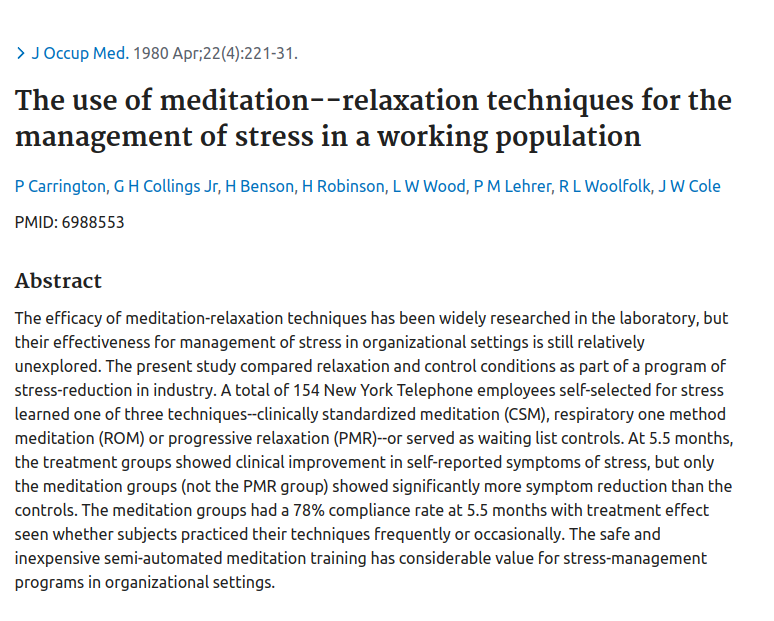The efficacy of meditation-relaxation techniques has been widely researched in the laboratory, but their effectiveness for management of stress in organizational settings is still relatively unexplored. The present study compared relaxation and control conditions as part of a program of stress-reduction in industry. A total of 154 New York Telephone employees self-selected for stress learned one of three techniques–clinically standardized meditation (CSM), respiratory one method meditation (ROM) or progressive relaxation (PMR)–or served as waiting list controls. At 5.5 months, the treatment groups showed clinical improvement in self-reported symptoms of stress, but only the meditation groups (not the PMR group) showed significantly more symptom reduction than the controls. The meditation groups had a 78% compliance rate at 5.5 months with treatment effect seen whether subjects practiced their techniques frequently or occasionally. The safe and inexpensive semi-automated meditation training has considerable value for stress-management programs in organizational settings.
The use of meditation--relaxation techniques for the management of stress in a working population
Publication
J Occup Med
22(4):221-31
Abstract
Web and Email Links
Related Listings
Journal
Obstet Gynecol
During a 5-month study, we examined the effects of the relaxation response on premenstrual syndrome in 46 women who were randomly assigned to one of three groups: a charting group, a reading group, and a relaxation response group. The relaxation response group showed significantly greater improvement than the charting and the reading groups on physical symptoms (P less than .025 for both comparisons). There was a significant group-by-severity effect for charting versus relaxation resp […]
Journal
The Lancet
To determine whether decreased sympathetic-nervous-system activity achieved by the relaxation response could decrease premature ventricular contractions (P.V.C.S), eleven ambulatory patients with proven, stable ischæmic heart-disease and P.V.C.s were investigated. The patients, who were taking no medication for the P.V.C.S, were trained to elicit regularly the relaxation response through a non-cultic psychological technique. The frequency of the P.V.C.s was measured by computer analys […]
Journal
Journal for the Scientific Study of Religion
Clinical observations suggesting a relationship between spiritual experiences, life purpose and satisfaction, and improvements in physical health led to the development of an Index of Core Spiritual Experience (INSPIRIT). Data from 83 medical outpatients showed the INSPIRIT to have a strong degree of internal reliability and concurrent validity. Multiple regression analyses showed the INSPIRIT to be associated with: (1) increased life purpose and satisfaction, a health-promoting attit […]

